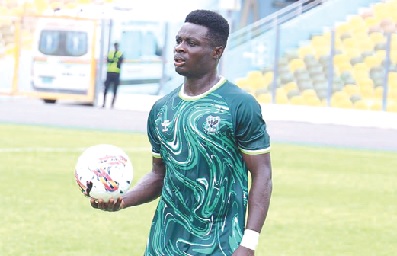FOR some time now, local players in Ghana have faced a daunting reality—representing the Black Stars often felt like an unreachable dream unless they ventured abroad.
Economic pressures, a challenging football environment and limited national team opportunities all drive promising players to pursue their careers outside Ghana as soon as they rise to prominence in the local league.
However, with Coach Otto Addo’s recent decision to include three local players in the national team call-up, a glimmer of hope has emerged, raising questions about the role of homegrown talent in Ghana’s football future.
In the past, local talent was a staple of the national team. Household names such as Habib Mohammed, Sammy Adjei, Shilla Illiasu and Haminu Dramani were plucked straight from Ghana’s league and made waves on the world stage.
Locals at 2006 World Cup
Their memorable performances at the 2006 World Cup are a testament to what local players, given the chance, can achieve.
That year, Shilla Alhassan proved his mettle when he stepped in to deliver a solid performance after a high-profile error by top defender Sammy Kuffour.
The presence of these players was not just symbolic; it reinforced the strength and pride of Ghana’s football pipeline, inspiring fans across the nation.
Today, Ghana's football local roots seem to have faded from the national team picture. With only a handful of local players called up in recent years, many feel the local league’s standard has declined, resulting in a gap between domestic players and their international counterparts.
Coach Addo’s call-up of three outfield players—Isaac Afful of FC Samartex 1996, Emmanuel Antwi of Kotoko and Razak Simpson of Nations FC—marks a significant shift toward integrating homegrown talent.
But with Ghana’s chances of qualifying for the Africa Cup of Nations (AFCON) slim, some critics argue that these inclusions might be more about filling out the squad than a genuine belief in local players’ potential.
Despite the increased number of local players, Coach Addo has stated his hesitations about the local players' readiness to compete at the same level as Ghana’s foreign-based players.
Ghana’s local league faces challenges in providing the high-intensity competition that players find in leagues abroad.
Players in the Ghana Premier League often don’t receive the same exposure to advanced training facilities, rigorous competition and tactical demands that are now the norm internationally.
Consequently, when called up, local players may feel the weight of expectations on them without having had the chance to develop in environments that would fully prepare them for the national team.
Bench warmers
Another recurring issue is the limited playing time for local players when they are called up. Frequently, local players warm the bench, serving more as symbolic inclusions than key contributors.
This trend, in turn, erodes confidence and denies fans the opportunity to see what local stars might bring to the team.
Advocates of local talent argue that if Ghana’s football system invested more faith in these players, it would not only uplift individual players but also strengthen the entire league.
This call-up could serve as a turning point but Ghana’s football system must be supported to bring lasting changes.
The Ghana Football Association (GFA) has the opportunity to improve local leagues by enhancing training facilities, investing in coaching and providing avenues for younger players to compete on a national level.
These steps are essential to restoring confidence in homegrown talent, proving that they don’t need to leave Ghana to achieve success.

